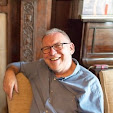Today I 'attended' my very first webinar (- for the uninitiated, a seminar conducted over the Internet). Hosted by the European Forum for Primary Care the webinar featured Mehmet Akman (a Turkish academic working in the field of primary care and based at Marmara University School of Medicine) who spoke about 'Using arts in the training of primary care professionals'.
Mehmet's presentation was underpinned by four key points:
1. Art, especially literature, is helpful for handling values rather than facts, ambivalence rather than reductionism, dealing with a world where not everything can be explained by experiments;
2. Art creates a stimulating environment for professionals to express their feelings and thoughts regarding different aspects of human nature and themselves in a reflective manner;
3. Art has a potential to support developing an ability to respond to human needs during clinical work;
4. When used for professional development, arts can have instrumental functions (e.g. better recognition of visual signs, developing skills to deal with uncertainty,) and non-instrumental functions (e.g. personal development, new ways of thinking beyond the biomedical perspective.) The latter can be achieved through sessions in which the intrinsic value of art can be retained.





